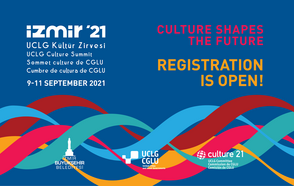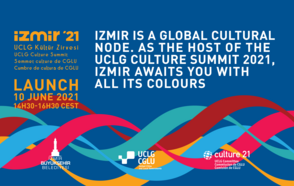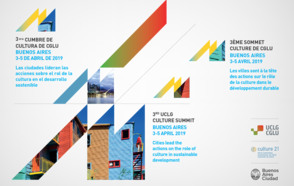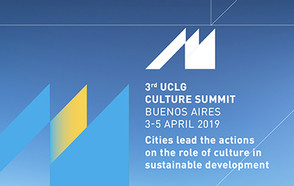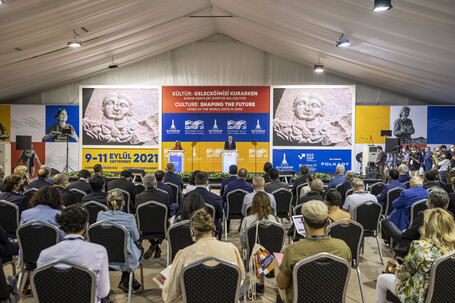
Over a year and a half after the outbreak of the COVID-19 pandemic, one of the most difficult crises of the 21st century, UCLG met physically and online for the first time in Izmir, Turkey, for the 4th edition of the UCLG Culture Summit.
The Culture Summit of UCLG has unequivocally become throughout the years the biggest and most important encounter on culture, sustainable development and local and regional governments.
Under the title “Culture: Shaping the Future”, local and regional elected leaders , cultural academics and activists, creative actors and sectors, members from international organisations and global cultural networks met physically and online, in a hybrid format, to discuss the central role of culture in sustainable development and related global development agendas, as well as its role in the renewal of the social contract in the Pact for the Future that UCLG is set to develop towards its World Summit in 2022.
The recent outbreak of the COVID-19 pandemic and the crisis generated at all levels clearly demonstrated the essential role of culture in all spheres of our lives. Culture has proven to be a central part of our daily lives, and the Culture Summit is further demonstrating how it can be a lever for a sustainable and fair recovery that leaves no one and no place behind. During three days, plenary and parallel sessions offered a space to foster multi-level and multi-actor dialogues on the crucial need to acknowledge cultural policies in addressing the current and forthcoming challenges of humanity, and cultural visits for those attending physically allowed to discover the impressing cultural heritage and the vibrant cultural life of Izmir.
DAY 1: Culture, key of a people-centred recovery and sustainable development
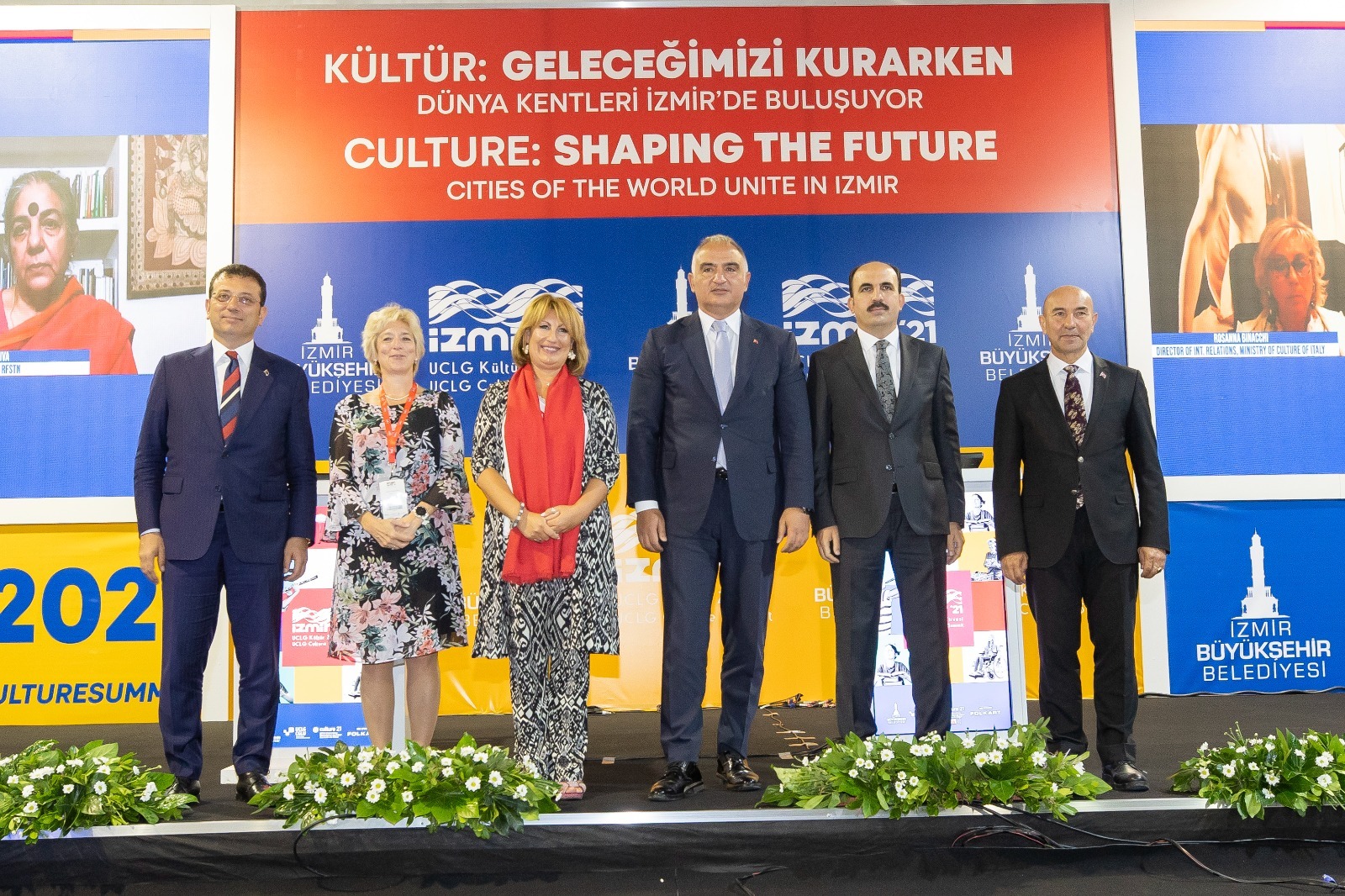
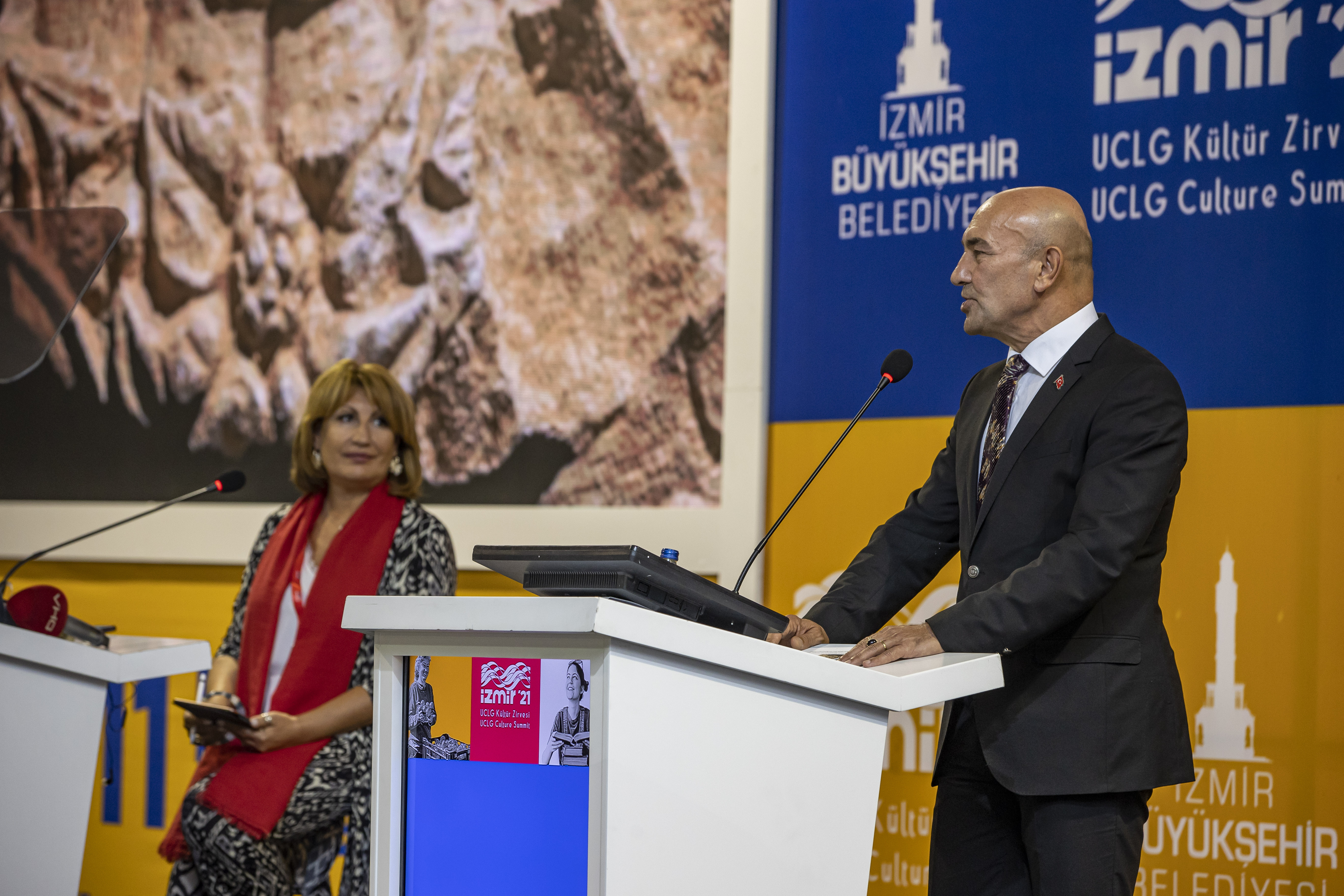 Six plenary sessions were held throughout the Summit. At the opening plenary, entitled “Culture, care, health and environment in the post COVID-19 era”, Tunç Soyer, Mayor of Izmir, welcomed all participants, physical and online, with an inspiring speech which emphasised the power of “culture as a cement that teaches us how to live in harmony with nature, with the past, with the change, and between ourselves”.
Six plenary sessions were held throughout the Summit. At the opening plenary, entitled “Culture, care, health and environment in the post COVID-19 era”, Tunç Soyer, Mayor of Izmir, welcomed all participants, physical and online, with an inspiring speech which emphasised the power of “culture as a cement that teaches us how to live in harmony with nature, with the past, with the change, and between ourselves”.
The UCLG Secretary General, Emilia Saiz, stressed that “Culture helps us get through the worst and the best of times, and therefore should be integrated in every single policy and solutions to global challenges. What we are proposing is that culture shapes our future, as the backbone of our Pact for the Future and a key in the UN global common agenda”.
The opening session also counted with the physical presence of Louisa Vinton, Resident Representative, United Nations Development Programme (UNDP) in Turkey, and an online intervention from Rosanna Binacchi, Director of International relations, Ministry of Culture of Italy, representing the Chair of G-20. After their interventions, Ekrem İmamoğlu, Mayor of Istanbul; Uğur İbrahim Altay, Mayor of Konya, and UCLG Co-president; Yavuz Selim Köşger, Governor of İzmir and Mehmet Nuri Ersoy, Minister of Culture and Tourism, Republic of Turkey, recalled the importance of culture in development and as a means for fostering local democracy. They promoted culture as the 4th pillar of sustainable development and stated that the recovery strategies should take cultural elements into account in order to be inclusive.
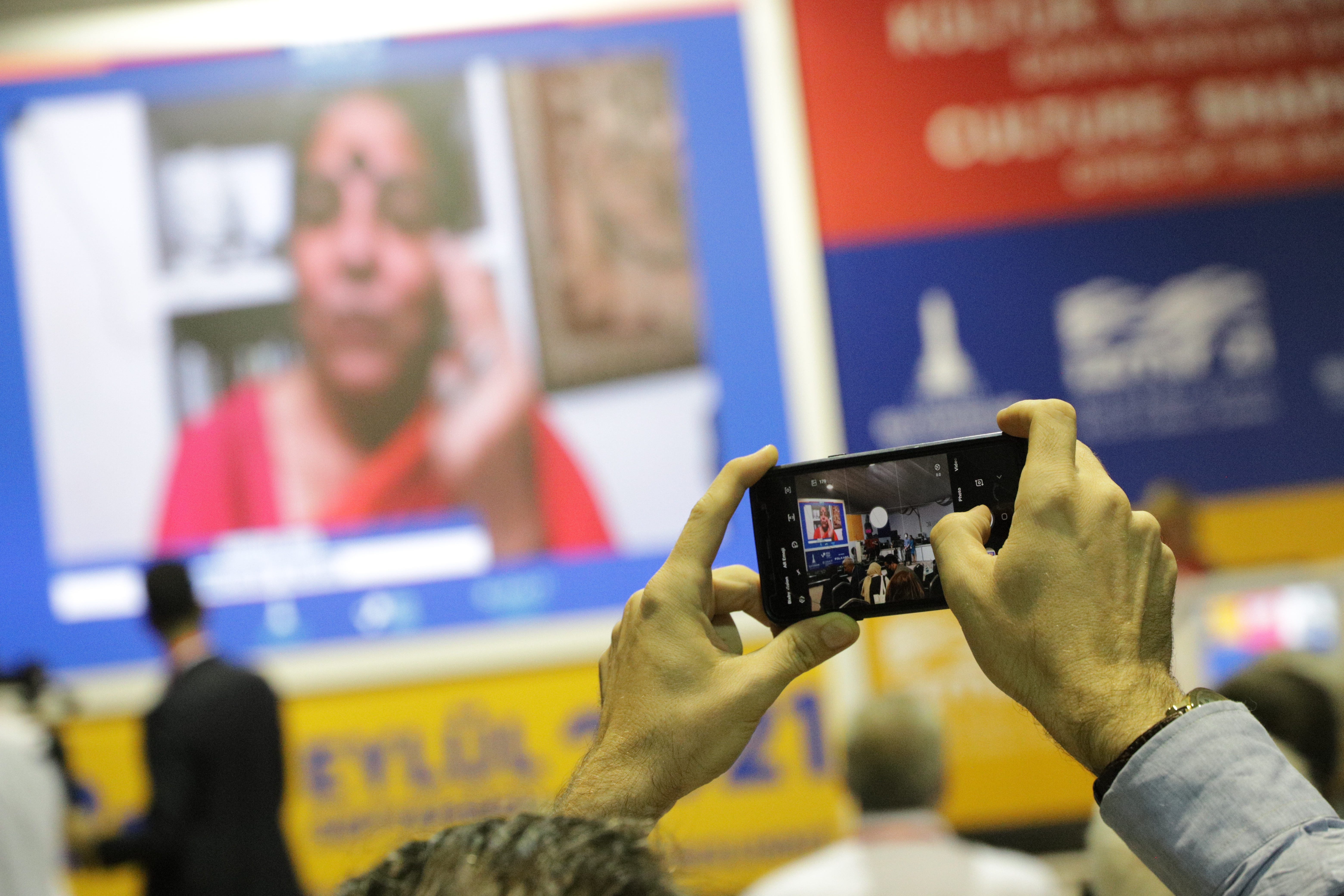
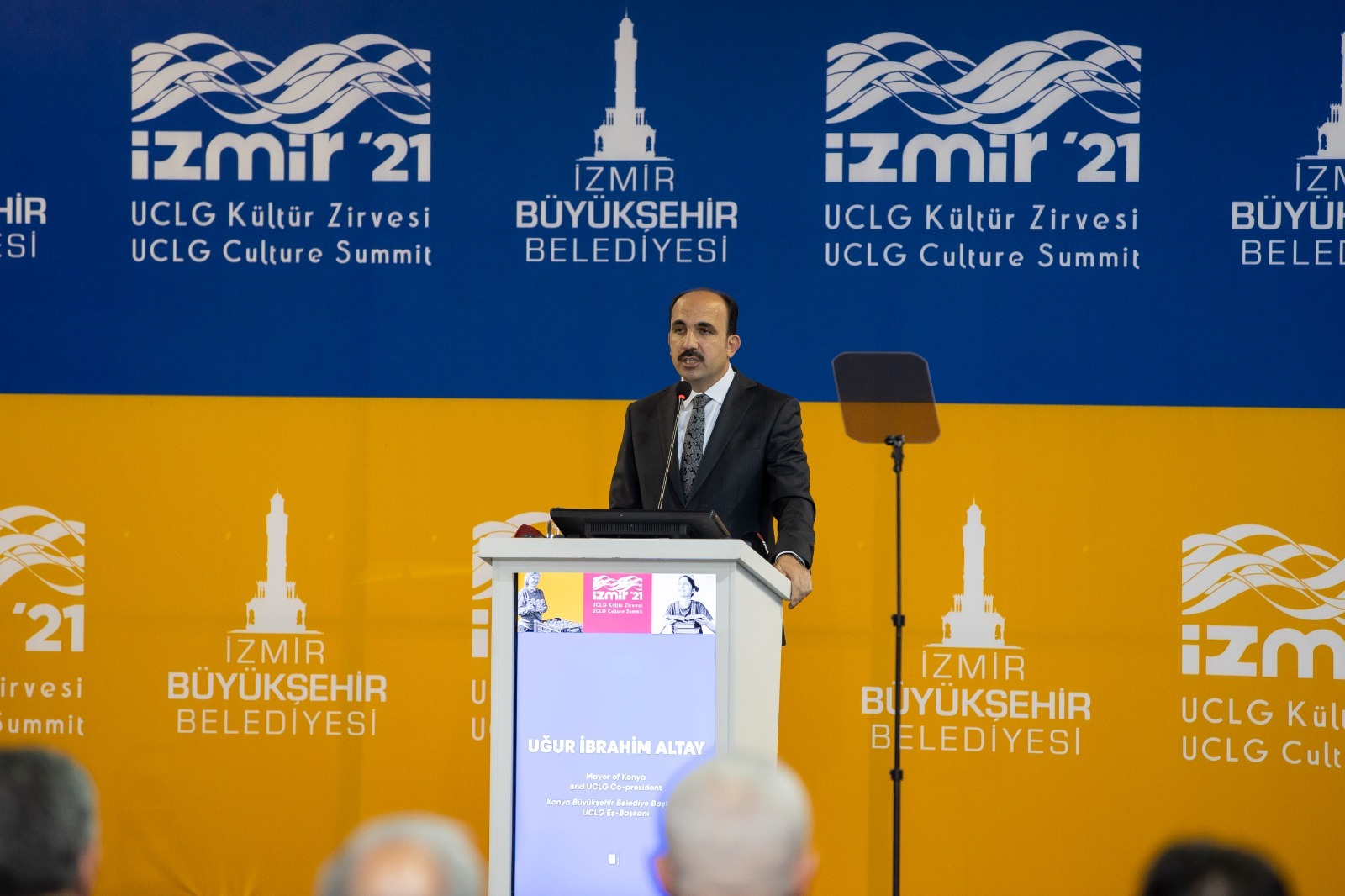
“Culture is the main component of creativity and heritage. Culture heritage should be protected and our heritage transmitted to the future generations” Uğur İbrahim Altay, Mayor of Konya, UCLG Co-President, in his opening words.
The session ended with two keynote speeches delivered by ecofeminist activist Vandana Shiva, Director of the Research Foundation for Science, Technology and Natural Resource Policy (RFSTN), and associate professor Serhan Ada, Head of Arts and Cultural Management Department and Director of the Cultural Policy and Management Research Center at the İstanbul Bilgi University. Shiva stressed the crucial need to “overcome the separation which we, as a society, tend to do between culture and nature, and between us and the others, embracing diversity and fostering democracy”. This was reinforced by Ada, who declared that “working on deepening the connections between culture and, not only wealth and environment, but also health and ecology must be the new priority for cities”.
Plenaries on the relation between cultural diversity and the creative economy on one hand, and cultural diplomacy on the other hand are permitted to address, among others, the role of local and regional governments regarding the European Year of the Creative Economy (2021) and international cultural cooperation in the post Covid era. The first session was facilitated by Valeria Marcolin, co-director of Culture and Development, and included a keynote speech by Nicolas Buchoud, President, Grand Paris Alliance for Metropolitan Development, who called for a creative economy agenda focusing on the interlinkages of areas such as urban infrastructure, heritage and trade. The Plenary session on international cultural cooperation was moderated by Onur Eryüce, Counsellor to the Mayor of Izmir, with the special address of Sana Ouchtati, Director, More Europe, who advocated on an enhanced cultural diplomacy in cities with different spheres of government and beyond usual actors.
DAY 2: Culture at the heart of UCLG Pact for the Future, for the People, for the Planet, for the Government
A full plenary moderated online by Bernadia Tjandradewi, Secretary General of UCLG-ASPAC, entitled “Promoting local actions on culture and gender equality” raised fundamental points not only on the need to achieve gender equality and women empowerment in cultural sectors and policies, but also on the cultural dimension of gender equality itself. In her keynote speech, Farida Shaheed, director of the Shirkah Ga women’s resources center and former UN Special Rapporteur in the field of Cultural Rights declared that “Gender inequalities exist everywhere, but the cultural parameters differ. We need new approaches to gender equality that include new urban narratives to support women’s self-expression in public space as well as enhancing their presence in decision-making and cultural policy-making to enhance democracy.”
The plenary dedicated to “Cultural Rights and Communities: the Rome Charter” was facilitated by Luca Trifone, Diplomatic Advisor to the Mayor of Rome, and included a keynote conversation between Karima Bennoune, UN Special Rapporteur in the field of Cultural Rights, and Luca Bergamo, former Vice Mayor in charge of Cultural Development, Rome City Council, and initiator of the Rome Charter. Bennoune argued that “The protection and promotion of cultural rights is a legal obligation. The decisions we make now determine the future of the XXIst century; this is why adopting rights-based approaches based on values such as solidarity and diversity is critical”, and that “The cultural piece is essential to address crises such as Afghanistan”, while Bergamo reaffirmed that “The Rome Charter on the Right to Participate Fully and Freely in Cultural Life, just like the U20 Declaration, underpin the fact that the responsibility to guarantee the accountability and implementation of cultural rights fall on the shoulders of local and regional governments”.
Several additional parallel sessions tackled important issues related to global challenges, such as cultural heritage; the UCLG “Seven Keys” programme on the importance of cultural policies when localizing the SDGs ; the cultural initiatives of UCLG regional sections; the growing importance paid to culture in Local Voluntary Reviews; the need that cultural policies and programmes explicitly connect with the climate emergency, cultural policies and innovation in the COVID-19crisis; culture and sustainable tourism; public space, urban planning and design; Cittaslow metropolises; as well as the #Culture2030G oal campaign. Those sessions combined different formats, including workshops and HUB talks, alongside plenaries, to favour proximity with the attendees in person and online so as to encourage their participation.
The 4th UCLG Culture Summit concluded with a closing plenary straightforwardly entitled “Towards a Culture Goal” which opened with a video-message from Ernesto Ottone, Assistant Director-General for Culture Sector, UNESCO, who reaffirmed that “cities play a critical role as engines of innovations, and measures implemented by cities have evolved the patterns of production and consumption towards more people-centred models”. Representing UN-Habitat, Shipra Narang Suri, Chief of the Urban Practices Branch of the Global Solutions Division, reaffirmed their commitment to “propel the inclusion of culture in the global conversation on sustainable development”. Mohamed Saadieh, President of UCLG-MEWA, and Ilsur Metshin, Mayor of Kazan and President of UNACLA, renewed their joint efforts to keep transforming the cultural vision into concrete actions, promoting culture as a key dimension of development.
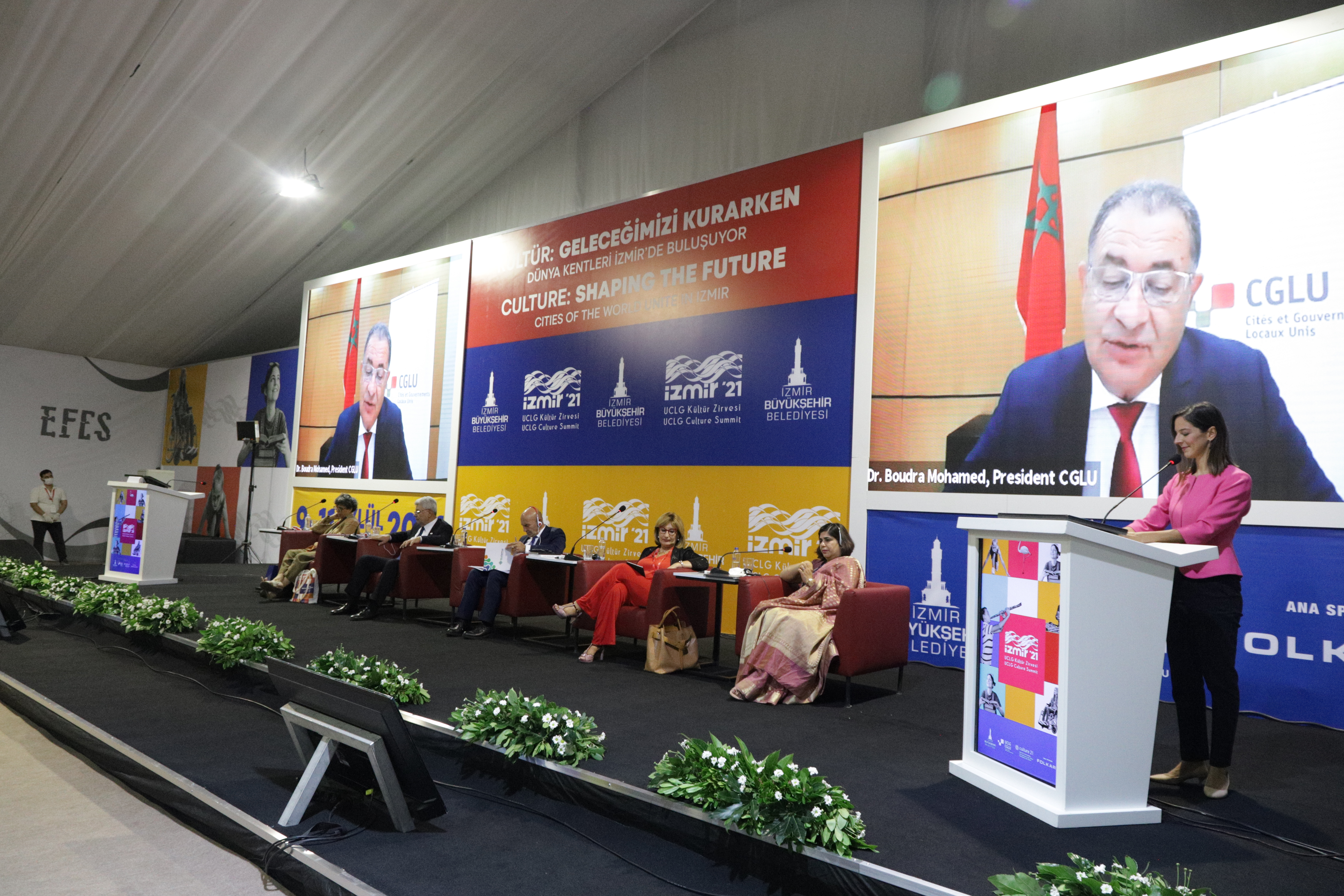
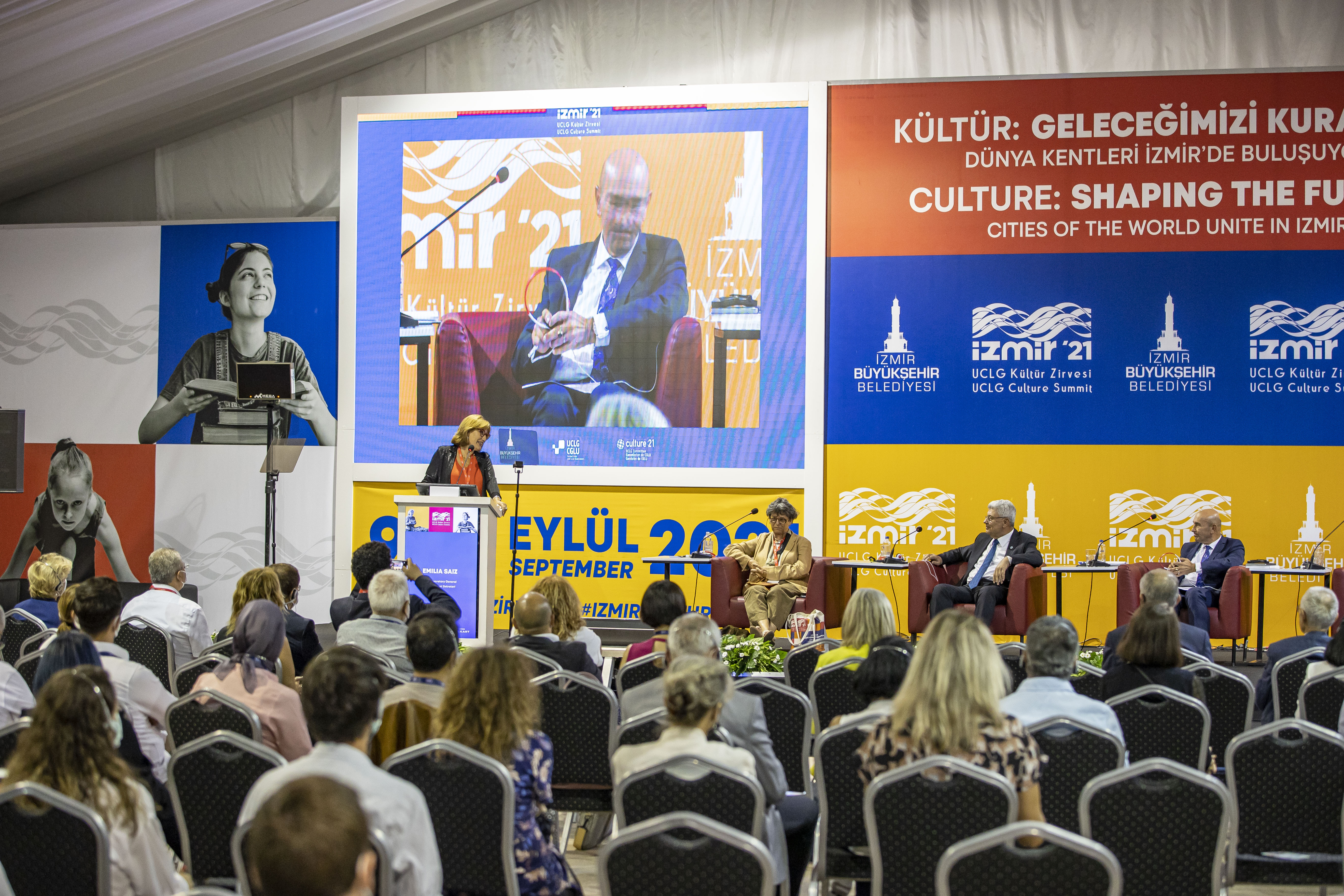
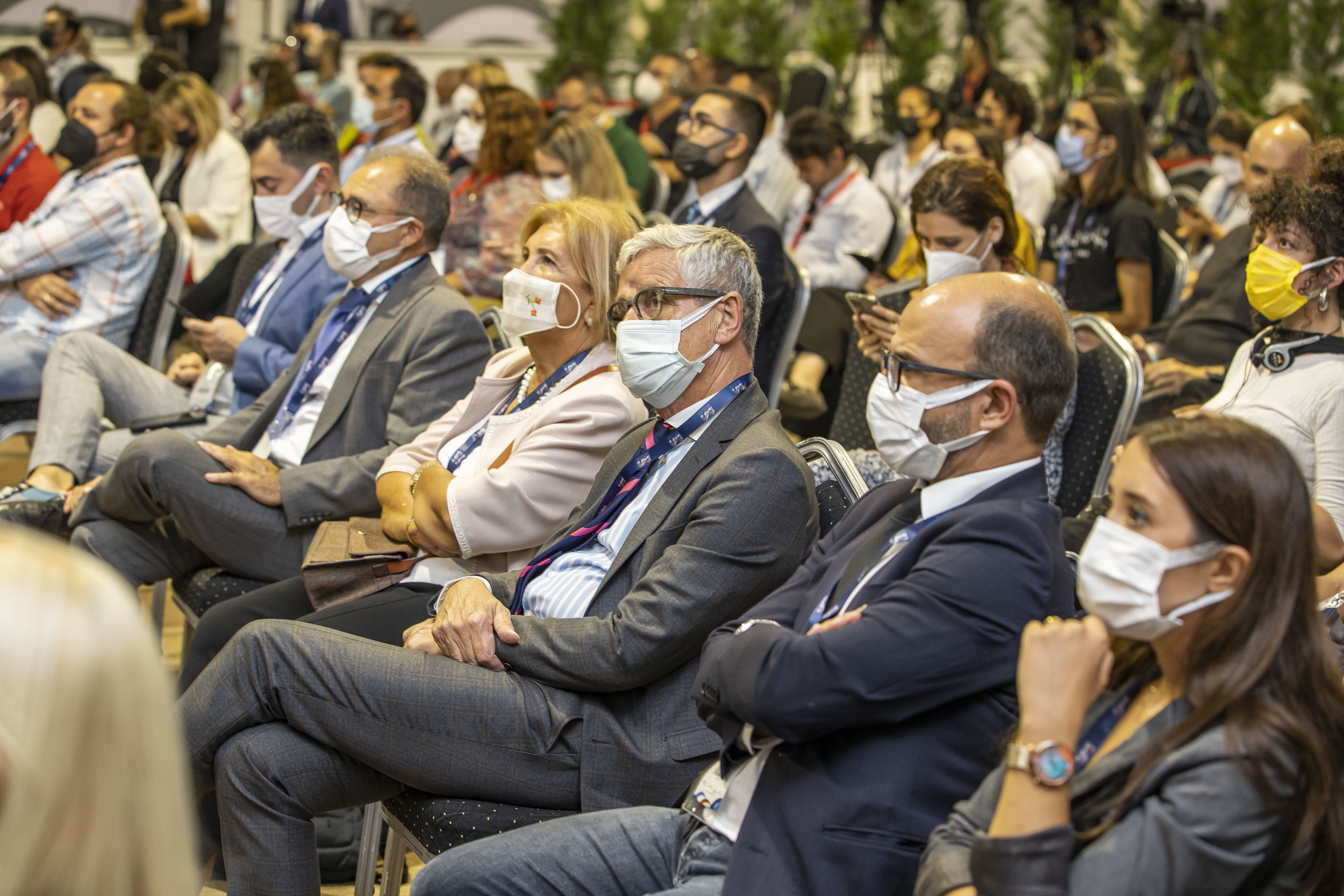
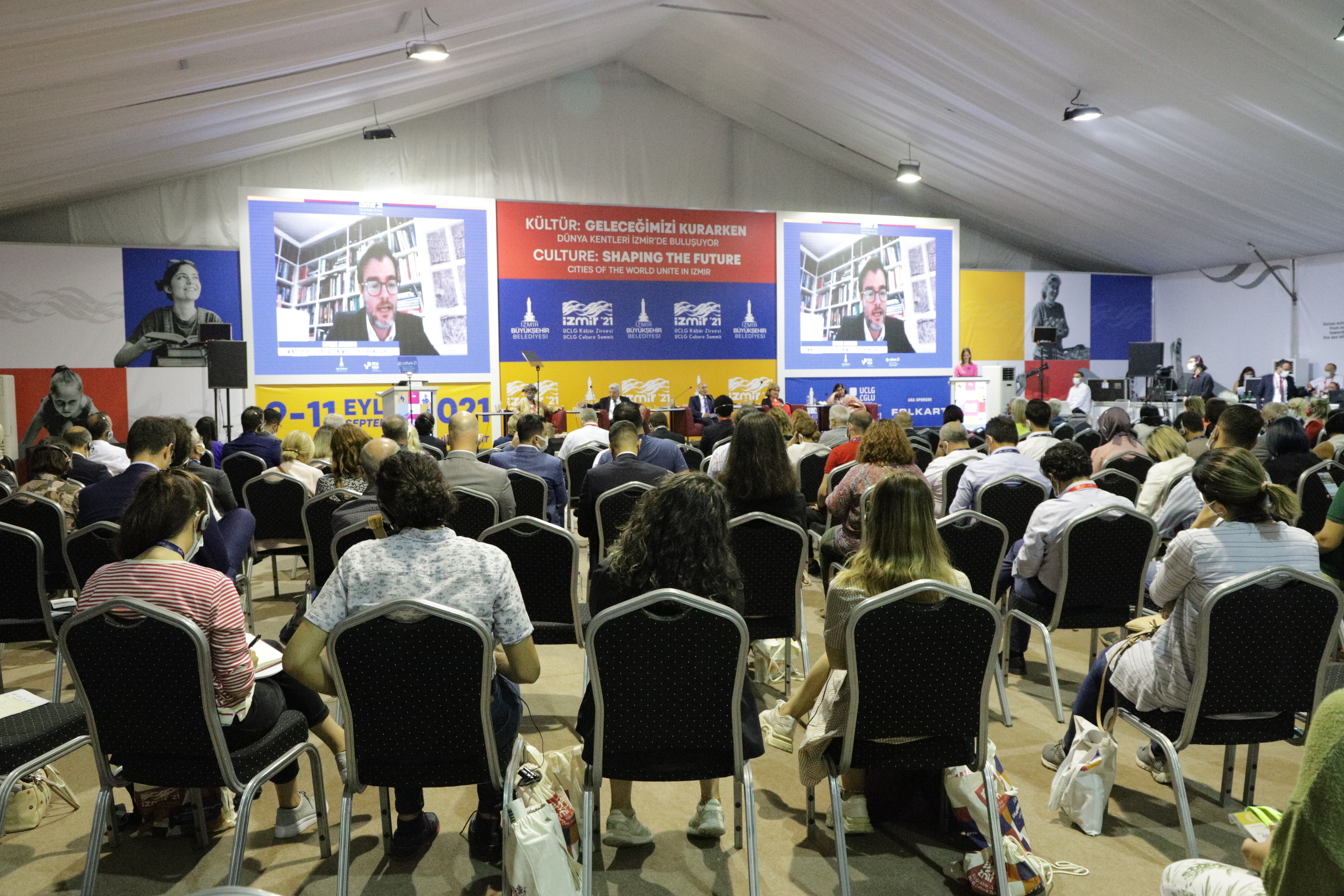
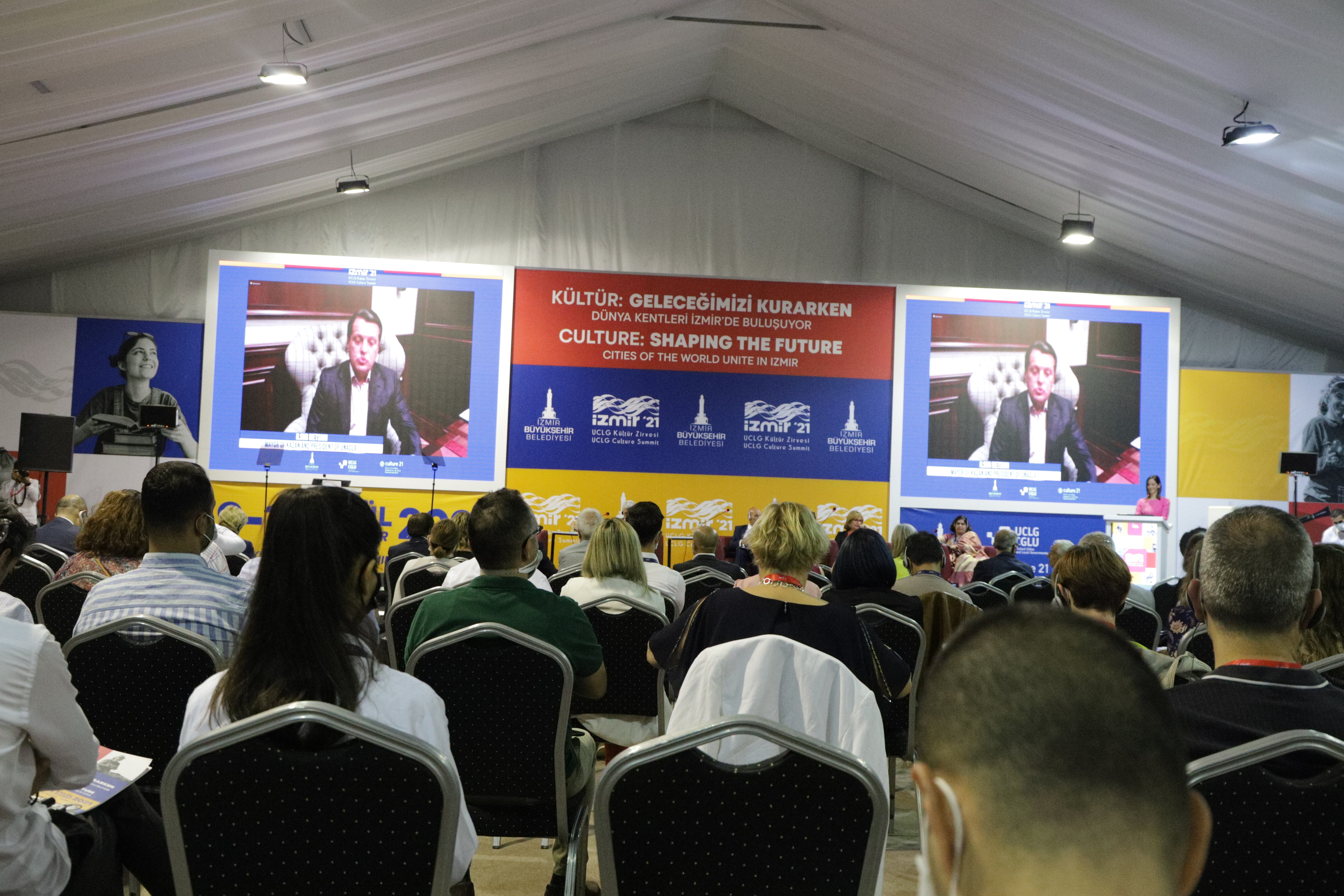
“The pandemic has become a catalyst of culture and creative industries, accelerating emerging 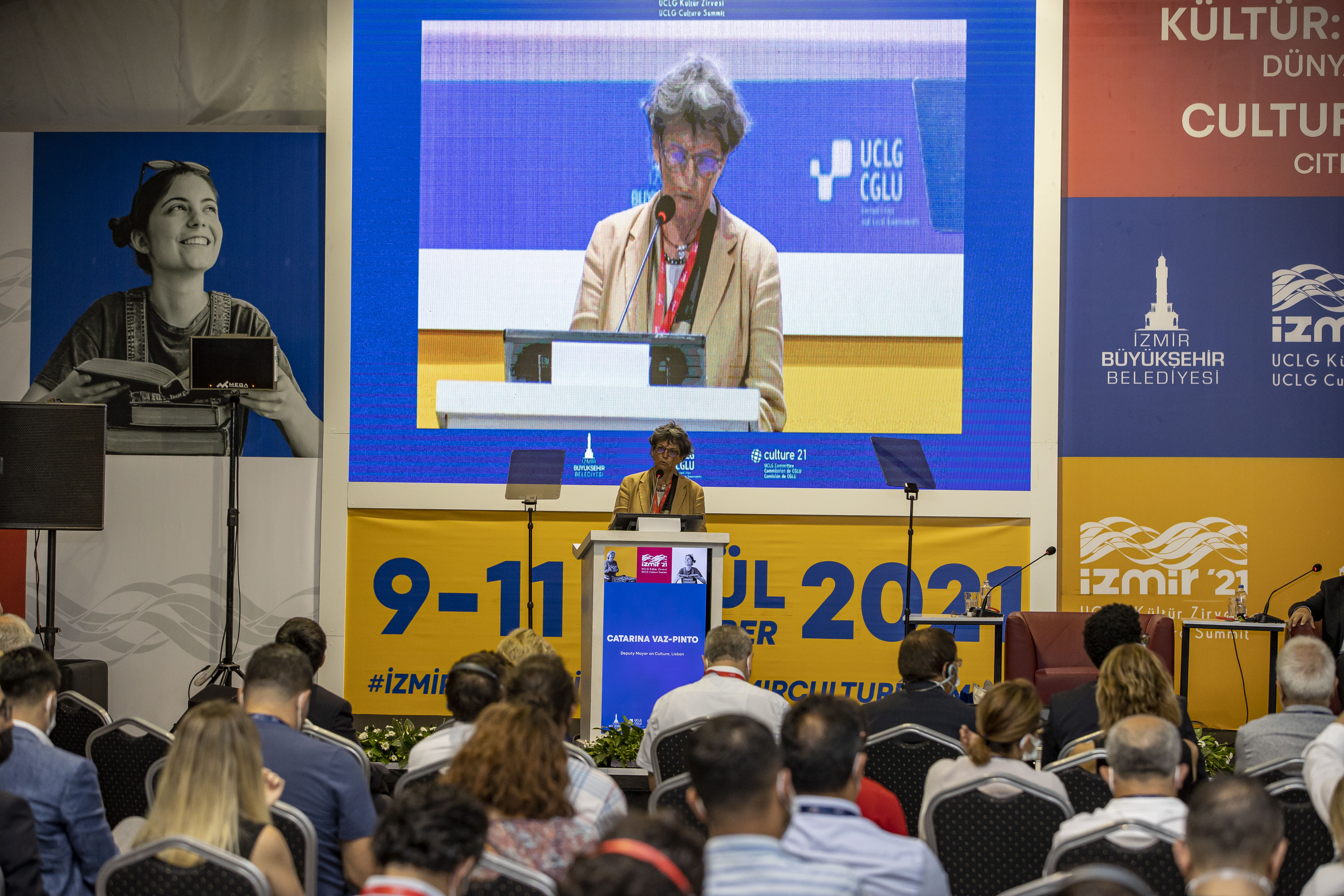 trends and opening new directions to the development of cities" Ilsur Metshin, Mayor of Kazan and President of UNACLA
trends and opening new directions to the development of cities" Ilsur Metshin, Mayor of Kazan and President of UNACLA
The co-presidency of the UCLG Committee on Culture also addressed the Summit. Speaking from Mexico City, José Alfonso Suárez del Real y Aguilera, Chief of the Mayor's Office, recalled the “fundamental role of culture in the UCLG Pact for the Future, as a vital human necessity that defines life today and the future of tomorrow”. Catarina Vaz-Pinto, Deputy Mayor on Culture, Lisbon, thanked the work done by the Culture Committee throughout the years and recalled “the essential need to have a Culture Goal in 2030 to ensure that the forthcoming development agendas are really for the People, for the Planet and for Governments”. Enrique Avogadro, Minister of culture, Autonomous City of Buenos Aires, stated that “today our duty is to get people who are not yet convinced that culture is a priority realising the potential of culture for transformative change”. Finally, the President of UCLG, Dr. Mohamed Boudra, emphasised that “the central role of culture is showing us who we are and how we can work together in a context of changes and a change of era. Culture speaks to all humanity”
The Summit ended with the performance Gypsy Fever Dance Performance, a choreography that integrates Balkan and Roman dances, which are the colors of Anatolian culture, and modern dance. The Summit has the Izmir Declaration: Culture Shapes the Future of Humanity, as the main outcome and a central contribution to the elaboration process of the UCLG Pact for the Future to be adopted at the UCLG World Congress in 2022; for the People, for the Planet, for Governments.
- Check our Flicker Allbums for the 1st day and 2nd day.
- Read the Izmir Declaration here.
- Read the inspiring speech of the Mayor of Izmir, Tunç Soyer.
- Read the full speech of the Mayor of Konya and Co-President of UCLG, Uğur İbrahim Altay.
- Watch a featured video of the Summit.











